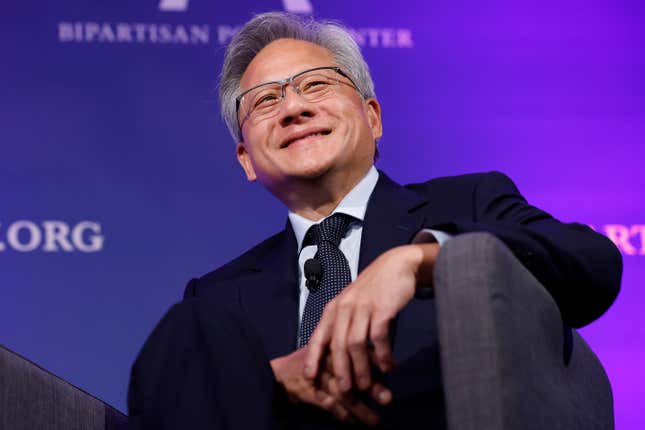
In This Story
Shares of Nvidia (NVDA+4.08%) briefly reached a new intraday high on Thursday after its Taiwanese chipmaking partner beat earnings expectations.
The chipmaker’s stock was up around 2.8% during mid-day trading on Thursday, at about $139.51 per share. Earlier in the day, the stock briefly climbed over 3% to set a new intraday record of $140.89 per share, according to CNBC. The stock’s last record intraday high was on June 20, when it reached $140.76 per share.
Taiwan Semiconductor Manufacturing Company’s (TSM+0.52%) shares were up around 12% during mid-day trading on Thursday after it beat earnings expectations for the third quarter.
The Taiwanese chipmaker reported revenue of NT$759.69 billion, or $23.5 billion, for the quarter ended September 30. Third-quarter revenue was up 36% year over year in U.S. dollars, TSMC said, and was up 12.9% from the previous quarter. In New Taiwan dollars, net income and diluted earnings per share (EPS) both rose 54.2%. TSMC was expected to report September-quarter revenue of $23.3 billion, according to analyst estimates compiled by FactSet (FDS-0.51%).
“Our business in the third quarter was supported by strong smartphone and AI-related demand for our industry-leading 3nm and 5nm technologies,” Wendell Huang, TSMC chief financial officer, said in a statement. “Moving into fourth quarter 2024, we expect our business to continue to be supported by strong demand for our leading-edge process technologies.”
TSMC, which counts Nvidia and Apple (AAPL+0.64%) as its main customers, has seen its shares rise over 107% so far this year.
Meanwhile, shares of Nvidia fell over 4% earlier this week after closing at a record high. The drop occurred following a report that the U.S. could cap sales of advanced artificial intelligence chips from U.S.-based chipmakers to certain countries. Biden administration officials in recent weeks have discussed putting a ceiling on export licenses for advanced AI chips, including those from Nvidia and rival AMD (AMD+1.27%), to countries in the Middle East, citing national security concerns, Bloomberg reported.

